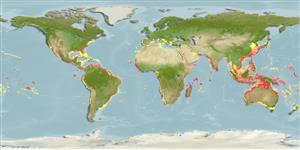Preferred temperature (Ref.
115969): 22.8 - 28.8, mean 27.5 (based on 5152 cells).
Phylogenetic diversity index (Ref.
82804): PD
50 = 1.0000 [Uniqueness, from 0.5 = low to 2.0 = high].
Bayesian length-weight: a=0.01000 (0.00584 - 0.01711), b=2.85 (2.70 - 3.00), in cm Total Length, based on LWR estimates for this species & (Sub)family-body (Ref.
93245).
ระดับชั้นอาหาร (Ref.
69278): 4.3 ±0.0 se; based on diet studies.
ความสามารถในการกลับคืนสู่ปกติ (Ref.
120179): ขนาดกลาง, เวลาต่ำสุดที่จะทำให้ประชากรเพิ่มขึ้นเป็น 2 เท่าใช้เวลา 1.4 - 4.4 ปี (tmax=6; K=0.6 is doubtful).
Prior r = 0.58, 95% CL = 0.39 - 0.88, Based on 2 data-limited stock assessments.
Fishing Vulnerability (Ref.
59153): Moderate to high vulnerability (51 of 100).
Climate Vulnerability (Ref.
125649): High to very high vulnerability (74 of 100).
